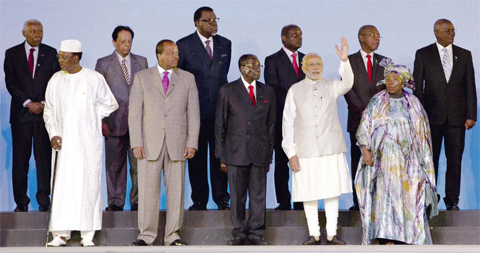 NEW DELHI: India's Prime Minister Narendra Modi said yesterday that India and Africa must join forces to call for reform of the United Nations to reflect the growing power of emerging nations on the global stage. In a speech to the India-Africa Forum Summit in New Delhi, Modi said the UN and other global institutions "risked becoming irrelevant" if they did not adapt to a changing political and economic landscape.
NEW DELHI: India's Prime Minister Narendra Modi said yesterday that India and Africa must join forces to call for reform of the United Nations to reflect the growing power of emerging nations on the global stage. In a speech to the India-Africa Forum Summit in New Delhi, Modi said the UN and other global institutions "risked becoming irrelevant" if they did not adapt to a changing political and economic landscape.
As the UN celebrates the 70th anniversary of its charter this month, the Indian premier said India and Africa should "speak in one voice" to seek "reforms of the United Nations, including its Security Council". India and Africa are together home to a third of the world's population, but neither India nor any African country has a permanent seat on the UN Security Council, which is made up of China, Russia, the United States, the United Kingdom and France.
"The world is undergoing political, economic, technological and security transition on a scale and speed rarely seen in recent history," Modi said, in a wide-ranging speech. "Yet our global institutions reflect the circumstances of the century that we left behind, not the one we are in today... unless they adjust to the changing world, they risk becoming irrelevant." His comments were echoed by Zimbabwean President Robert Mugabe, who took to the stage directly afterwards to say that India and Africa had remained "underdogs" in the UN.
Mugabe, also the current African Union chairman, called for Africa to have greater representation on the Security Council, which he described as "defective".
"We are saying that we demand equality... We are saying, let's amend the charter of the UN," he said.
Bright spots
Modi described India and Africa as bright spots of hope and economic opportunity and offered technology and credit in an effort to match rival China's influence over the continent at a summit with more than 40 African leaders yesterday.
As Modi opened the meeting in the Indian capital, he said Africa was now more settled and stable and "its initiatives are replacing old fault lines with new bridges of reforms and economic integration."
Modi said in less than a decade India's trade with Africa has topped $70 billion and that the continent is a major destination for Indian business investment. India has committed $7.4 billion in low-interest credits and $1.2 billion in grants since the first India-Africa Summit in 2008. It is developing infrastructure, public transport, clean energy, irrigation, agriculture and manufacturing capacity across Africa, he said. African energy helps fuel the Indian economy and African prosperity offers a growing market for Indian products, he said.
In exchange, India hopes for a share of Africa's vast natural resources to power its own growth. It also wants to ensure it is not completely overshadowed on the continent by China, which has plowed billions of dollars into Africa, building roads, bridges and power installations in return for access to markets and resources.
India's major imports from Africa are resources and minerals, including crude oil, coal, gemstones and gold. African countries are a big market for Indian-made pharmaceuticals, motor vehicles and processed petroleum products, with trade growing quickly. Modi shared Africa's concern for security, especially from terrorism and extremism, and said he had confidence that African leaders and people would rise to those challenges.
Several countries, including Cameroon, Nigeria, Niger, Chad and Benin, sought Indian assistance in dealing with Islamic extremism. They want India to help build their defense capacity so the military forces that are now fighting Boko Haram can be strengthened, said Sanjiv Kohli, an Indian External Affairs Ministry official.
India has promised to help train soldiers in counterterrorism and counterinsurgency tactics, Kohli said. Modi regretted that India had not done as well as African nations wanted at times. "There are commitments we have not fulfilled as quickly as we should have," he said. "We will raise the level of our support for your vision of a prosperous, integrated and united Africa that is a major partner for the world," he said.
Zimbabwean President Robert Mugabe thanked India for its development work in Africa, but said there should be a "robust evaluation and follow up mechanism as some of the projects have been delayed." "These are gifts highly appreciated by us. These do not come from those who have robbed us of our humanity," said Mugabe, who addressed the summit as chairman of the African Union. - Agencies










